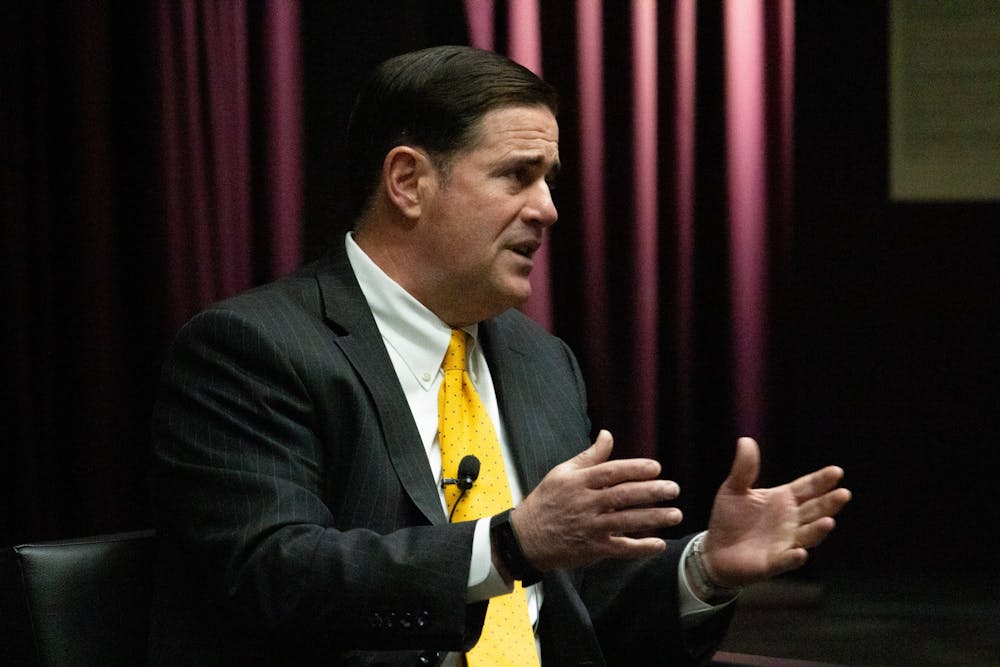Gov. Doug Ducey spoke to students and faculty about free speech, school choice and the importance of civic education Thursday night at ASU.
The University’s political history and leadership program, through the School of Historical, Philosophical and Religious Studies, hosted the governor in hopes of hearing about the future of education in the state.
"I learned a lot of new things," said Cohlton Kieffer, a sophomore studying political science. "(Ducey) emphasized school choice a lot, which I learned the effects and implications of."
Other members of the audience included faculty members of the school, donors, members of the Arizona Board of Regents and University alumni.
Ducey opened his speech thanking the University for allowing him to speak. He cracked jokes about his college decision and talked about school choice.
Ducey said he is in favor of school choice, where public funds follow a student to whichever schooling option they choose to attend, even if it is not a public school.
"Public education is about educating the public. I like the idea of the student and their parent making the choice," Ducey said.
He addressed free speech on college campuses too, calling the University a place where he felt "comfortable" speaking.
"Universities create the competition of ideas," Ducey said. "More speech is better."
When it comes to emphasizing intellectual diversity about civics, Ducey said that most of the people who live in Arizona are not originally from Arizona.
"There's no good ol' boys club here; there's no establishment," Ducey said.
He said that a university with diverse fields of study helps to increase education about what government does and how it impacts the daily lives of students.
Ducey also addressed the audience, which asked if privatization of public education would be put above using tax dollars to educate Arizona children. He said things like the courts, public safety and other components of carrying out the law should not be privatized.
"As the chief executive of state government, I understand there are things that government needs to pay for," Ducey said. "But when we can find someone who can do it better or set up competition, there's a good reason to (privatize)."
Students who are currently attending the University, like Kieffer, are not always able to see the tangible results of economic investment. However, Kieffer said that working with faculty and donors at his job at the ASU Foundation has helped him see the effects Ducey spoke about.
"Contact with donors across the cities of Phoenix and Tempe, and seeing these relationships, the philanthropic side of things, I'm able to see and hear about the opportunities that are being given to young professionals," Kieffer said.
Ducey also highlighted legislation this session that would establish a Sandra Day O'Connor Civics Day, and he mentioned the money in the rainy day fund that Ducey hopes to invest in education.
Ducey has spoken to students in the political history and leadership program before. The program officially launched in September 2014, with hopes of educating students about the context and history of politics.
In 2015, Ducey visited students and called the lack of education surrounding civic engagement a "quiet crisis." According to the program's four-year report, the event raised publicity of the program locally and nationally.
Ducey said Thursday that Arizona is doing things differently, in the "Arizona way," and part of that is by making civics a priority.
"It all comes down to school choice: it's a civil rights issue, it's a moral imperative," Ducey said.
Reach the reporter at pjhanse1@asu.edu and follow @piperjhansen on Twitter.
Like The State Press on Facebook and follow @statepress on Twitter.

Piper Hansen is the digital editor-in-chief at The State Press, overseeing all digital content. Joining SP in Spring 2020, she has covered student government, housing and COVID-19. She has previously written about state politics for The Arizona Republic and the Arizona Capitol Times and covers social justice for Cronkite News.




